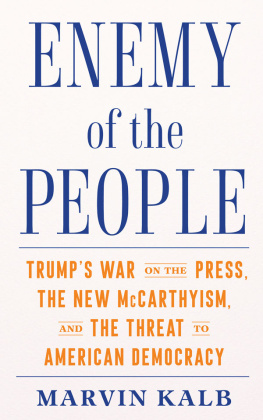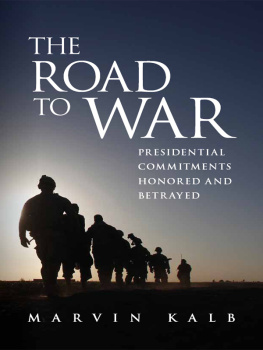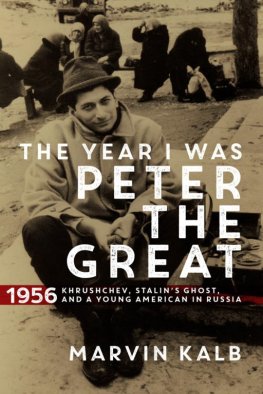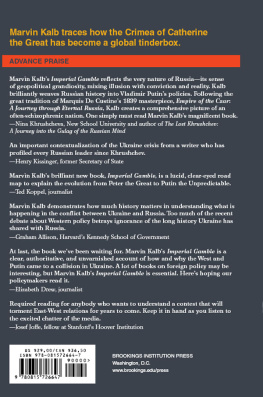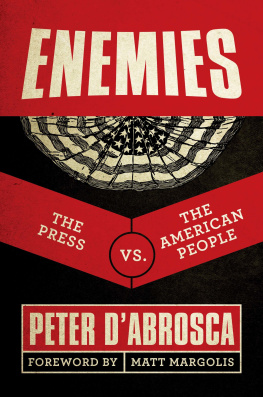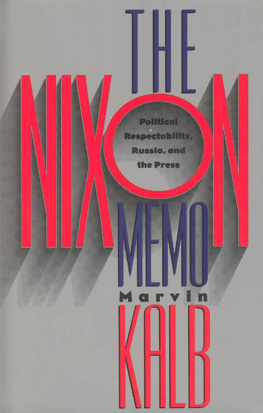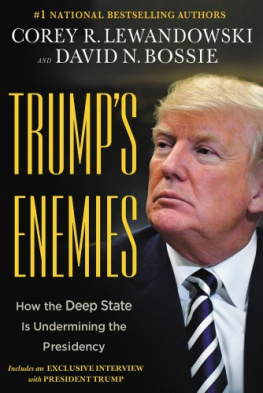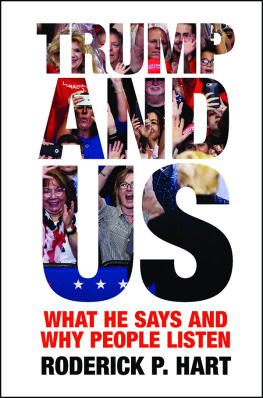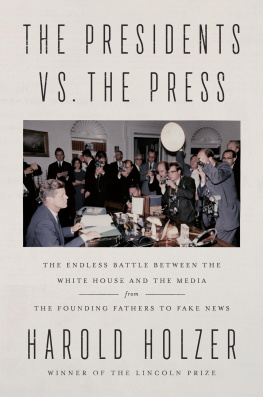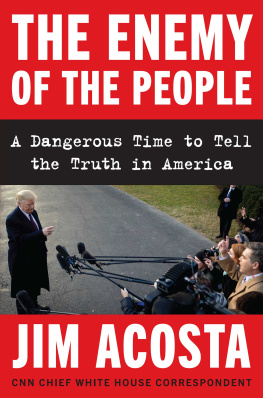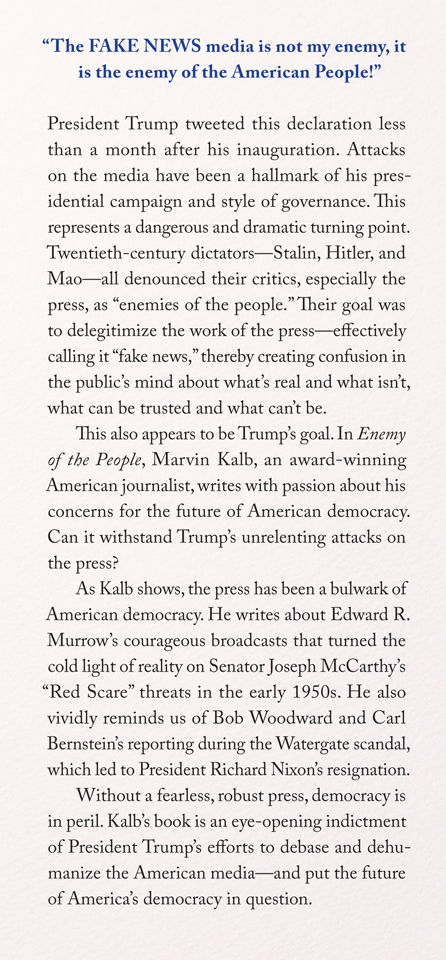ENEMY
OF THE
PEOPLE
Trumps War on the Press,
the New McCarthyism,
and the Threat to American Democracy
MARVIN KALB
BROOKINGS INSTITUTION PRESS
Washington, D.C.
Copyright 2018
THE BROOKINGS INSTITUTION
1775 Massachusetts Avenue, N.W., Washington, D.C. 20036
www.brookings.edu
All rights reserved. No part of this publication may be reproduced or transmitted in any form or by any means without permission in writing from the Brookings Institution Press.
The Brookings Institution is a private nonprofit organization devoted to research, education, and publication on important issues of domestic and foreign policy. Its principal purpose is to bring the highest quality independent research and analysis to bear on current and emerging policy problems. Interpretations or conclusions in Brookings publications should be understood to be solely those of the authors.
Library of Congress Cataloging-in-Publication data are available.
ISBN 978-0-8157-3530-4 (cloth : alk. paper)
ISBN 978-0-8157-3531-1 (ebook)
9 8 7 6 5 4 3 2 1
Composition by Elliott Beard
Contents
Acknowledgments
I OWE THE IDEA for this book to the keen imagination of Bill Finan, director of the Brookings Institution Press. He sensed my concern for the future of a free press in America and proposed a book dedicated to the importance of a free press in a free society. In no way was the press ever to be considered an enemy of the people. Quite the contrary! I am grateful to Bill and his dedicated staffYelba Quinn, Elliott Beard, Marjorie Pannell, John Felton, Steven Roman, Kristen Harrison, and C. J. Purdyfor making the passage from idea to book so smooth.
From the beginning of this effort, I have been encouraged by Jon Sawyer, executive director of the remarkable Pulitzer Center, where I have served as senior adviser. Kem Sawyer always sparked ideas while offering editorial direction. Both Sawyers provided a helping hand whenever they sensed I needed one. Nathalie Applewhite, Ann Peters, Jeff Bartholet, Tom Hundley, Karen Oliver, Jeff Barrus, Jin Ding, Steve Sapienza, and all the Fellows at the center were fabulously helpful and created a warm, friendly environment.
Next door, the Brookings Institution was a second home, where I was surrounded by friends loaded with intellectual stimulation. Led by the redoubtable John Allen, a former four-star Marine general, now president of the institution, Brookings always sought to make things better, and it often did.
Mike Freedman, the executive producer of The Kalb Report, a public affairs radio and television program now in its twenty-fifth year at the National Press Club, has always been a right arm for me, but, with this book, more so than ever. He provided ideas, energy, and encouragement until the writing was finally done. And then he did more.
Several friends put up with my questions and also served as sources of invaluable editorial guidance. Among them I must mention Andrew Glass, Garrett Mitchell, Walter Reich, and Stephen Hess. Many others helped too, but they led the parade.
As always, my incomparable brother, Bernard, read and edited every page, always encouraging, always dedicated to better journalism.
My daughters, Deborah and Judith, were unbelievably loving and supportive. The same for my sons-in-law, Alex Ogden and David Levitt. My grandchildren, Aaron and Eloise, are the emotional spark plugs of my life. I want them to inherit a better world, and that is not now certain.
Finally, with this book, even more than with the earlier ones, my wife, Madeleine, was the initial inspiration, and as the research and writing proceeded, she was always there with additional encouragementand it was often needed during this project. Thank you, and bless you for never letting me forget that a free press, unafraid of official pressure or disparagement, is essential to the functioning of a free country. With a free press, we have the foundation of our democracy. Without it, we have.
Preface
FOR THE LONGEST TIME, I did not take Donald Trump seriously; and when I did, finally, it was too latehe was already president of the United States, arguably the most powerful politician in the world.
When Trump launched his campaign for the presidency in June 2015, he was seen by many, me included, as a comic character, a real estate huckster who enjoyed life on the society pages of the New York tabloids, one divorce or scandal after another, jumping into the presidential run, as sixteen others already had, more for the fun of it, for the endless pursuit of personal glory, than for the opportunity to lead a great nation in a perilous time. With a canny mix of outrageous, off-the-cuff, anti-establishment, populist, seemingly senseless attacks on people, policy, and tradition and a clever exploitation of cable television news, he quickly rose to become the center of news coverage and conversation, conveying an impression of political strength, durability, and pizzazz. One sector of the American electorate had been yearning for someone new and magically authentic, and Trump, with his catchy sloganMake America Great Againcaught their eye and began filling their basket of expectations.
After a few months, one by one, his Republican opponents began dropping out of the race. They could not attract enough of the television coverage that Trump had successfully dominated with his wild, unorthodox eruptions. Without the coverage, they were soon without money. Donors looked elsewhere. By the summer of 2016 there was no one left in the once crowded field of GOP hopefuls except the jokester from Fifth Avenue. Trump had stumped the political world: he won most of the televised debates and an unusual number of primary elections. He might have started out as the unlikeliest of candidates, but, in July 2016, at the Republican National Convention, as TV pundits shook their heads in utter bewilderment and supporters dizzily screamed Lock her up!referring to political opponent Hillary ClintonTrump was officially crowned the GOP presidential nominee.
At the time, like many others, I watched Trumps remarkable rise as a major political force in American life, but, because I assumed that in the end Clinton, the Democratic frontrunner, would win the November election, I was not alarmed. I was troubled, of course, deeply disturbed that one of Americas two major parties could settle on a candidate so clearly unprepared and unsuited to be president. I winced whenever I heard Trump demean judges and humiliate journalists, especially one with an obvious physical impairment; raise questions about the need for alliances such as NATO or trade agreements such as NAFTA; champion an America First domestic and foreign policy; question the governments role in providing affordable health care; and challenge environmental policies that have helped keep air and water clean and safe. He was certainly not my candidatenot because of his policy positions as a Republican (I had voted for many of those) but because he was Trump. Most especially, I suppose, because of the many years I spent covering the totalitarian excesses of the Soviet Union, I was upset that a presidential candidate would consistently undermine the values of a free press, which, for me, represented the heart and soul of a vibrant democracy.
But again, like so many others, I cushioned my concerns about Trump in the comfortable conviction that even though he was a very troubling prospect, Clinton would win the election and he would return to Trump Tower in New York, his tail between his legs.
Underappreciated at the time by both the U.S. government and the usually alert press corps was a considerable Russian effort to undermine the American electoral system, in the process doing the unimaginable in U.S.-Russian relations to this point: actively supporting one candidate, Trump, while undercutting the other, Clinton. Whether Russian help was decisive in Trumps ultimate victory might never be known definitively. Or whether the true explanation for Trumps unexpected victory lay in former FBI director James Comeys startling and unprecedented last-minute intrusions into the political process, which obviously undercut Clintons prospects. Or whether it was Julian Assanges WikiLeaks, disgorging thousands of damaging emails about Clinton and her staff at key moments of the campaignemails he reportedly obtained from the Russians by way of clever cutouts. Or whether, in the final analysis, the culprit was Clinton herself, unable, even with the winning hand she was dealt, to bring home the win.

